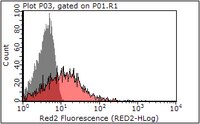Endogenous anti-HER2 antibodies block HER2 phosphorylation and signaling through extracellular signal-regulated kinase.
Montgomery, R Bruce, et al.
Cancer Res., 65: 650-6 (2005)
2005
Show Abstract
Immunologic targeting of the oncoprotein HER2/neu with monoclonal antibodies is an important component of current therapeutic strategies for patients with locally and systemically advanced breast cancer. Engineered antibodies targeting HER2 may have agonist or antagonist effects on HER2, but little is known about whether endogenous antibodies modulate HER2 activity. Vaccination of patients with HER2 peptides successfully induced antibodies in a minority of patients with HER2-expressing malignancy. A subset of antibodies specifically suppressed phosphorylation of HER2 on tyrosine Y1248, a residue critical for HER2 signaling through extracellular signal-regulated kinase. These antibodies also suppressed extracellular signal-regulated kinase phosphorylation and inhibited colony formation in soft agar. The majority of the antibodies that suppressed HER2 phosphorylation displayed specificity for amino acids 328 to 345 and 369 to 384. The isotype of anti-HER2 antibodies was predominantly IgG3 of low avidity, suggesting a Th1 response to peptide vaccine. Endogenous anti-HER2 antibodies can effectively suppress HER2 kinase activity and downstream signaling to inhibit the transformed phenotype of HER2-expressing tumor cells. | 15695410
 |
Generation and characterization of monoclonal antibodies specific for the human neu oncogene product, p185.
McKenzie, S J, et al.
Oncogene, 4: 543-8 (1989)
1989
Show Abstract
A series of monoclonal antibodies specific for the extracellular domain of the human neu gene product (p185) have been produced. The generation of these monoclonal antibodies, and their biochemical and immunological characterization is described. The immunization protocol utilized a series of injections of NIH3T3 cells, cyclophosphamide, and a neu transfected NIH3T3 cell line (designated 18-3-7) which expressed the full length human neu-encoded protein. This immunization regimen induced an immune response to the extracellular portion of p185 on the 18-3-7 cells. A panel of ten hybridomas were identified which secreted monoclonal antibodies with a variety of epitope specificities, and reacted with p185 in a number of different experimental formats. As the neu gene product has been associated with human breast cancers, a series of monoclonal antibodies such as these could prove useful in the diagnosis, prognosis and/or treatment of these human malignancies. | 2566965
 |









